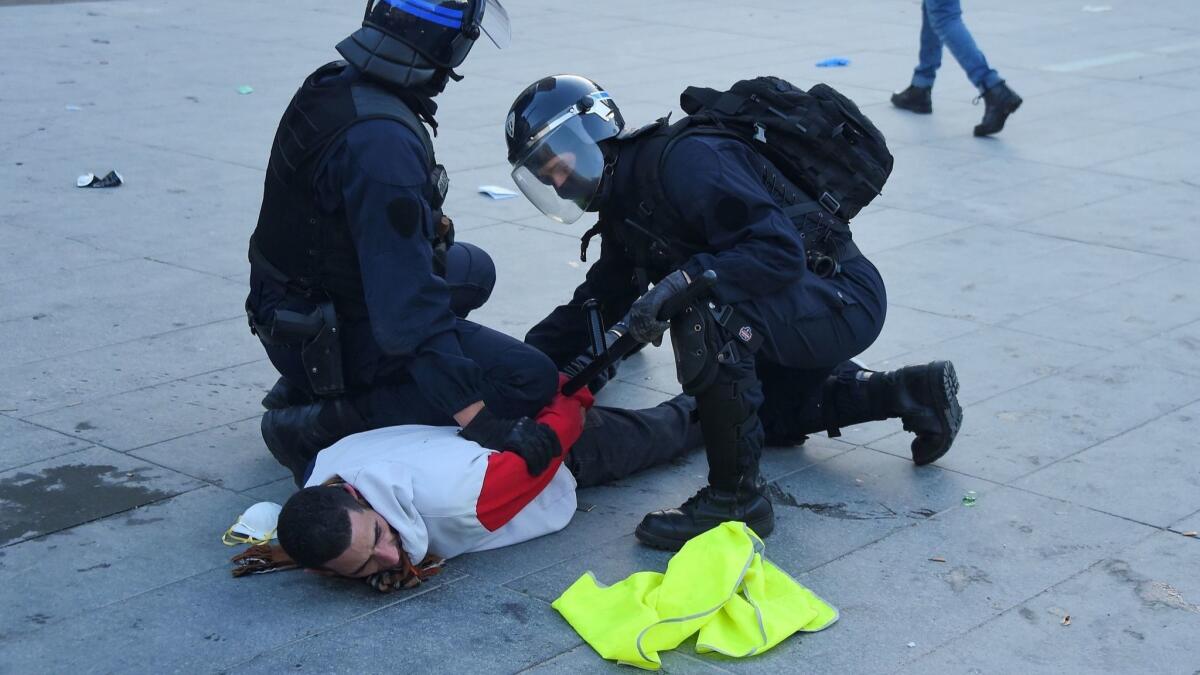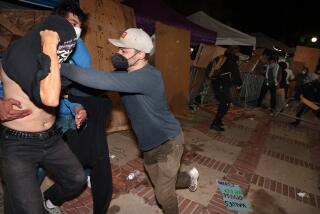Tear gas and hate speech mark 14th ‘yellow vest’ protest in Paris

- Share via
Reporting from PARIS — Police fired tear gas and brought in water cannons and a horse brigade to disperse several thousand “yellow vest” protesters Saturday massed near a Paris landmark at the end of a march through the French capital, the 14th straight weekend of demonstrations.
Anti-Semitic remarks hurled by a few at a noted philosopher on the protesters’ route were the bitter finale to a day of tension.
Acrid clouds of tear gas filled the esplanade of Les Invalides monument, obscuring the gold dome that crowns the structure housing Napoleon’s tomb.
Tension also marked demonstrations in other cities.
In Rouen, in Normandy, a car blocked by demonstrators pushed through the crowd, slightly injuring four people, the all-news channel BFMTV reported. Police used tear gas and water cannons in Bordeaux, a stronghold of the yellow vest movement, and other cities on the 14th straight Saturday of protests. Another demonstration in the capital was planned for Sunday to mark three months since the movement held its first nationwide protests Nov. 17.
In Paris, an array of insults, some anti-Semitic, by a handful of yellow vest protesters targeted a well-known French philosopher, Alain Finkielkraut, underscoring excesses that surge within an increasingly divided movement with radical fringes.
President Emmanuel Macron tweeted that “the anti-Semitic injuries he received are the absolute negation of what we are and of what makes us a great nation.”
The president’s was among a chorus of tweets, with Interior Minister Christophe Castaner denouncing “the surge of pure hate,” while government spokesman Benjamin Griveaux tweeted that “the ugly beast lurks in the anonymity of the crowd.”
The insults included words like “Zionist!” and “Go back to Tel Aviv!” and “We are France!” Finkielkraut once showed sympathy for the movement but criticized it in a recent interview with Le Figaro daily. Some yellow vest protesters have expressed racist or anti-Semitic views online and on the sidelines of protests.
“I felt an absolute hate,” Finkielkraut told the Sunday paper Le Journal du Dimanche. He expressed relief that police intervened.
Lines of riot police used tear gas and an impressive backup, a special horse brigade and water cannons — apparently not used — to force the agitated crowd to disperse.
The Paris prosecutor’s office said 15 people were detained for questioning, far less than the scores detained in earlier, larger demonstrations that degenerated into scattered rioting and destruction.
Violence has marked most of the protests that started against fuel taxes and grew into a mass movement against Macron and his pro-business policies. However, the increasingly divided movement is having trouble maintaining momentum as well as the support of the public, which initially massively backed protesters, polls showed.
French media quoted the Interior Ministry as saying that 41,500 protesters nationwide turned out Saturday, about 10,000 less than the previous week, with 5,000 in Paris.
“No social peace without equitable sharing…. The people aren’t a milk cow,” was the message scrawled on a wooden cross, carried by a protester dressed in monk’s garb.
In Paris, tensions mounted as the more than four-hour march ended at the Invalides. Projectiles were thrown at police, some by masked individuals dressed in black, a uniform for ultra-leftist protesters known as black blocs. BFM showed people running after moving police cars, hitting the windows.
The march — one of seven yellow vest demonstrations in Paris on Saturday — began hours earlier at the Arc de Triomphe at the top of the Champs-Elysees, the stage of past rioting, and wound through Paris, from moneyed Right Bank streets with high-fashion boutiques to Left Bank student quarters.
Many French are asking aloud how long the yellow vest movement will keep up its protests, which drain security forces and have dented the French economy.
Emilie Bidois, from the Normandy town of Gisors, who was taking part in the Paris protest, admitted she was growing tired — but remaining determined.
“We’re fed up but we won’t give up. We won’t give up on anything because they want to muzzle us and we want to be heard,” she said. “I will carry on until the movement runs out of steam, if it runs out of steam, but I don’t think it will.”
Leo Peyrade, a 70-year-old Parisian, referred to the violence that has hit numerous protests, often triggered by small extremist groups, and said he has learned to be careful. Last week, a young protester lost four fingers from a grenade. Others have lost eyes.
“Every time I come, some are wounded, arms, legs. I’m careful,” he said. “I can’t run like a young person, not as fast in any event.”
More to Read
Sign up for Essential California
The most important California stories and recommendations in your inbox every morning.
You may occasionally receive promotional content from the Los Angeles Times.










